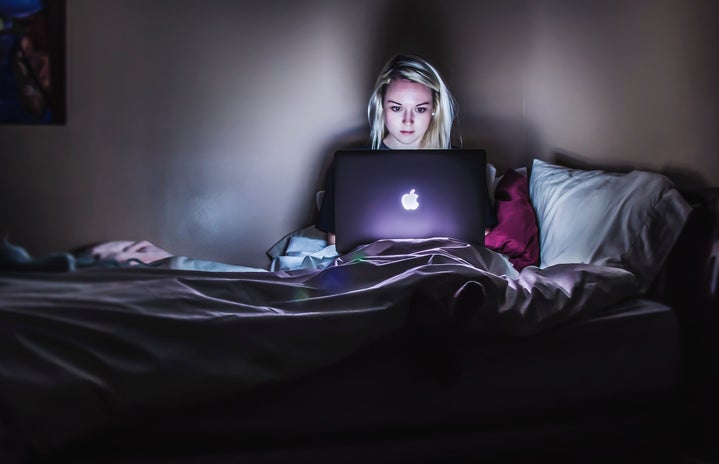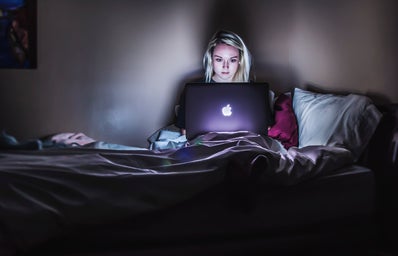With the ongoing COVID-19 pandemic, quarantine has forced everyone to move their lives online. From work, to class, to even keeping up with old friends, everything can now be done on screen rather than in-person. However, this ‘new normal’ is also posing another health risk for people at home: One of eye damage and constant eyestrain.
Last semester, I remember finishing my final paper and the relief I felt when I finally pressed that submit button. I thought to reward myself by taking a long, long, long nap — just to catch up on all the sleep I lost in the name of making it through finals. After waking up from that nap, I opened my eyes slowly but closed them immediately after. They still felt tired and heavy, even though my body was already well-rested. I thought that this was going to be a one-time thing — only during finals — but this tired feeling in my eyes would be a reoccurring event even in the summer as I pursued an online internship.
During my internship, I was in front of a computer for 6 hours a day. And then when work was over, I would turn to my phone to browse Twitter and Instagram for hours on end. Suffice to say, my eyes suffered and eventually began to strain. However, this was only the beginning. I had to wait a month or so more before regulations allowed me to schedule an appointment with an optometrist. I haven’t begun to mention the quiet fear I felt when coming in contact with medical tools that were used on other patients during a pandemic. However, in order to continue on with this new online normal, I had to make sure I could stand to continue working with screens.
As students are returning to school online, there has been a vocal concern from parents about the potential of eye damage for their children. According to optometrist, Dr. Katherine White, “Any time you’re spending more than two hours continuously staring at a screen, we are worried about digital eyestrain and discomfort”. However, 2 hours a day is simply one class period for a CLU student on Tuesdays and Thursdays. Clearly, as students (and only as students — not yet counting the hours we spend on screen for jobs, internships, or recreational purposes), the pandemic has forced us to look at screens way longer than we should.

Fortunately, I was able to get prescribed new reading glasses and got them with a blue-light blocking lens. My new glasses have practically been my lifeline these past few weeks of classes. However, let’s not get to the point we need to struggle to see an optometrist. Here are a couple of tips you can follow in order to minimize and prevent eye strain.
1. MIND YOUR POSTURE AND YOUR WORK STATION
Did you know that your posture affects your eyes? When you think about it, slouching and hunching over to get a closer look at your computer isn’t ideal. Experts suggest that our computer should be just below your line of sight as a slight downward gaze is easier to maintain than looking straight across or looking above your line of sight.
Aside from preventing eye damage, proper posture simply ensures that you will be able to work on your computer for hours at a time. Other than being mindful of your posture, it’s also important to adapt your work station according to your needs. For me, I’ve placed my laptop on top of some books, giving it some height so I can look down on it without straining. I’ve also played Goldilocks recently with the chairs in my family’s house, trying to figure out which one is just right for me. Something with a tall and soft backrest is my way to go.
2. CHANGE UP THE SETTINGS OF PHONE OR COMPUTER
Do so in a way that prevents you from straining your eyes even more. Don’t be embarrassed to increase the font size of your documents or toggle with the brightness of your phone for your needs. Try to look for a ‘night shift’ option on your phones or computers and turning it on once in a while in order to block out your screen’s blue light.
Another tip I can give is turning off the color on your phone. Color stimulates your sense of sight, and so disabling it for a moment allows your eyes to rest. I’ve found that doing this before going to bed extremely helps with sleep, as I spend less time scrolling through Instagram to see the next image.
For my fellow iPhone users, you can follow this article on how to disable the color on your phone.
3. TAKE FREQUENT BREAKS
This feels like a no-brainer tip, but it’s something we often forget, especially when we’re in the middle of class. Experts recommend you follow the 20-20-20 rule: for every 20 minutes you spend on screen, divert your attention to something 20 feet away for 20 seconds. Repeat as necessary.
Another thing I have found to be helpful is finding hobbies that require you to get off the phone or computer. Rather than relaxing by watching a bunch of YouTube videos or binging Netflix, take the time to do something else or learn something new. For me, it’s rekindling my love for reading physical books. When I was concerned about the strain my eyes were going through, I bought a ton of books to keep me busy. Now, after a long day of work or class, I allow myself a few moments of rest by reading a good chapter or two. Besides, reading is a much more soothing pastime that puts me right to sleep rather than spending an hour or two on my phone. Again, this helps minimize my screen time and maximizes my sleep time.




